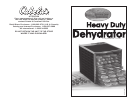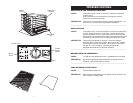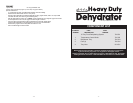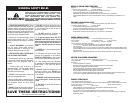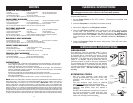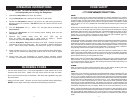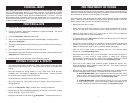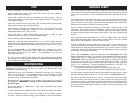
As with most types of cooking, proper preparation is essential for successful results.
Adhering to a few basic guidelines will greatly increase the quality of your dried foods
and decrease the amount of time necessary to dry them.
Pre-treated foods often taste better and have a better appearance than non-treated
foods. There are several methods to pre-treat food to prevent oxidation, which will
darken apples, pears, peaches and bananas while drying:
• Remove any pits, skin or cores.
• Shred, slice or dice the food uniformly. Slices should be between 1/4” (0.6 cm)
and 3/4” (1.9 cm) thick. Meats should be cut no more than 3/16” (0.5 cm) thick.
• Steamorroastmeatto160˚F(71
o
C)andpoultryto165˚F(74
o
C) as measured
with a food thermometer before dehydrating.
• The temperature of the Dehydrator mustbemaintainedat130-140˚F(55-60
o
C)
throughout the drying process.
• Drying fish into jerky requires a lot of attention. It must be cleaned and de-boned
properly and rinsed thoroughly to ensure that all the blood is washed away.
Steamorbakethefishat200˚F(93
o
C) until flaky before dehydrating.
• Soak cut fruit in either lemon or pineapple juice for a few minutes before
placing out on the Dehydrating Trays.
• Use an ascorbic acid mix which can be purchased in most health food stores or
pharmacies. It may come in either powder or tablet form. Dissolve
approximately 2-3 tablespoons into 1 quart (1 liter) of water. Soak the fruit slices
into the solution for 2-3 minutes, then place on the Dehydrating Trays.
• Fruits with a wax coating (figs, peaches, grapes, blueberries, prunes, etc.)
should be dipped in boiling water to remove the wax. This allows moisture to
escape easily when dehydrating.
• Blanching can pre-treat food for dehydrating. Blanching does not destroy helpful
enzymes and helps retain nutrients. There are two ways to blanch food:
1. WATER BLANCHING: Use a large pan; fill it half way with water. Bring
water to a boil. Place food directly into boiling water and cover. Remove
after three minutes. Arrange food on the Dehydrating Trays.
2. STEAM BLANCHING: Using steamer pot bring 2-3” (5-7 cm) of water
to a boil in bottom section. Place food in steamer basket and steam for 3-5
minutes. Remove steamed food and arrange on Dehydrating Trays.
PRE-TREATMENT OF FOODS
Wrap jerky/snack sticks in aluminum foil and store in a thick plastic food storage
bag, or place jerky/snack sticks in a jar with a tight lid. Avoid storage in plastic
containers or bags without first wrapping in aluminum foil or wax paper. Jerky/snack
sticks should be stored in a dark, dry place between 50-60°F (10-16
o
C). You can
store properly dried jerky/snack sticks at room temperature for 1 to 2 months. To
extend the shelf life to up to 6 months, store jerky/snack sticks in the freezer. Be sure
to label and date all packages.
STORING JERKY
DRYING FLOWERS & CRAFTS
• The flowers should be dry to start with, best if picked after the dew has dried
and before the night damp sets in. Dry the flowers as soon as possible after
picking.
• The best condition for drying flowers is a dry, warm, dark, clean and well
ventilated area, which makes a dehydrator an ideal setting. Flowers will retain
the best color and condition when dried quickly.
• A low temperature should be used to retain the natural oils.
• Strip off the leaves or if you prefer to keep the foliage. Discard any brown or
damaged leaves.
• Place on the Dehydrator Tray in a single layer, avoiding overlapping.
• Drying times will vary considerably depending on the size of the flower and the
amountoffoliage.Dryat100˚F(38
o
C).
• Dough art and beads can be dried in the Dehydrator. Temperatures may vary.
1. Select ripe or slightly over-ripe fruits. Wash and remove blemishes, pits and skin.
2. Puree in a blender. Add yogurt, sweeteners or spices as desired. The puree
should be thick in consistancy.
3. Cover the Dehydrator Trays with plastic wrap.
4. Pour 1-1/2 to 2 cups of the puree onto the covered Trays. Carefully place the
Trays in the Dehydrator.
5. The edges will dry quicker than the center, pour the puree thinner at the center of
the Tray.
6. The average drying time for the fruit roll-ups is 4 to 6 hours.
7. Once the fruit roll-ups are shiny and non-sticky to the touch, remove them from the
Dehydrator and allow them to cool.
8. Peel the fruit roll-up from the plastic wrap and roll into cylinders.
FRUIT ROLL-UPS
-7--10-



